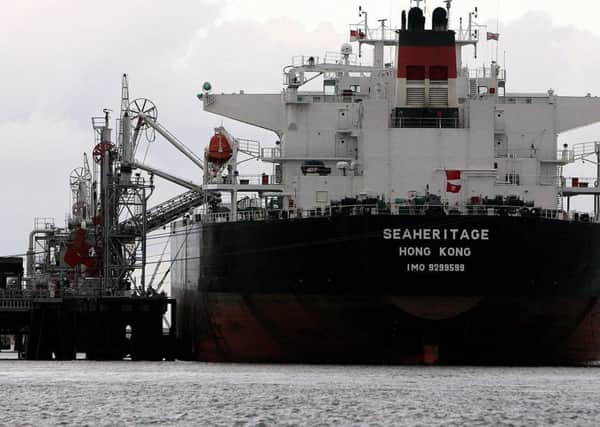Rishi Sunak: Free Ports could help restore UK's trading spirit


That Captain Cook hailed from the mightiest of Britain’s counties is now common knowledge. What is less widely known is the provenance of his ship. Specially built with a flat-bottomed hull to allow the safe navigation of unknown waters, the HMS Endeavour was built not in the shipyards of the Clyde or the Tyne but by Thomas Fishburn; Whitby’s most famous shipbuilder.
At its peak, Whitby was home to the nation’s third largest shipbuilding industry – surpassed only by Newcastle and London – and was the home of influential innovations such as the crow’s nest.
Advertisement
Hide AdAdvertisement
Hide AdBut while the workshops of the Whitby shipwrights may have long since fallen silent, the North’s maritime story is far from over. Despite the North of England making up just 20 per cent of the country’s population, its ports still punch well above their weight, accounting for a hefty 35 per cent of national shipping capacity. Indeed, the ports of Tyne and Tees have already attracted the UK’s most successful chemicals cluster as well as automotive giants like Nissan.
After Britain leaves the EU, the Government can create Free Ports across the North to propel our great ports to yet greater success.
Dating back some 2,500 years, the idea of a Free Port is a simple one; an area of dockland exempted from import tariffs and customs duties, with the intention of boosting trade.
In recent decades, Free Ports have become an increasingly popular tool for governments across the world, helping them support job creating manufacturers who might otherwise be tempted by cheaper labour overseas.
Advertisement
Hide AdAdvertisement
Hide AdIn the US for example, Free Ports like Boston and Seattle are designated as being legally outside American customs territory. That means businesses like Nissan can import components into the Free Port, manufacture, and then re-export cars without anything passing through US customs and incurring tariffs. Goods manufactured for the home market, meanwhile, benefit from streamlined red-tape and flexibility on import tariffs.
Keeping costs down in this way has allowed America to retain and attract manufacturing jobs in a way that would otherwise have been impossible.
When it comes to retaining manufacturing jobs, Britain needs all the ideas it can get. In 1952 Britain was responsible for 25 per cent of the world’s manufacturing exports. Now that figure is just two per cent, with the UK manufacturing sector ranking 30th of 35 OECD countries. And yet, of the world’s 3,500 Free Ports, not a single one is found in mainland Britain.
The responsibility for our failure to capitalise on Free Ports lies with the European Union. Thanks to the rules of the Customs Union, if the UK wanted its manufacturers to benefit from Free Ports, it would first have to prove that this wouldn’t damage the interests of other EU countries.
Advertisement
Hide AdAdvertisement
Hide AdWith every special interest group, from French lawnmower makers to Hungarian vineyards, looking to defend their turf, this effectively leaves British Free Ports dead in the water, with the threat of endless legal challenges lying in wait for any government foolhardy enough to try.
If Britain leaves the Customs Union as part of Brexit, all that will change.
With the newfound freedom to designate docks, and the industrial clusters that rely on them, as Free Ports, the Government would find itself with a powerful new arsenal for creating high quality jobs in the North. Indeed, if the US is anything to go by, the scheme could be worth as many as 80,000 new manufacturing jobs for the British economy by enticing a new generation of manufacturers to our shores.
This process could be helped along by a new programme of targeted tax incentives, rewarding companies that invest in research and create new jobs in the areas that need them most – something that is currently very difficult thanks to Europe’s stringent State Aid regulations.
Advertisement
Hide AdAdvertisement
Hide AdThe North’s impressive record in the ports sector is also part of a wider British success story. We may no longer rule the waves, but our ports remain among the world’s most advanced. Handling 96 per cent of UK trade, the British ports sector is the second largest in Europe and, unlike its EU counterparts, doesn’t rely subsidies from the taxpayer.
Just over 250 years ago the factories of Liverpool, Sheffield and Leeds began a revolution of ideas and invention that changed our country forever. Yet it was the nation’s great ports, from Hull to Glasgow, which ensured we were able to export that revolution to the world, building a trading superpower so mighty that one in every three of the world’s ships soon flew the Union Jack.
Brexit offers Britain the best opportunity it has had for half a century to recapture that buccaneering sprit of Free Trade.
Rishi Sunak is MP for Richmond. His report ‘The Free Ports Opportunity’ was published recently by the Centre for Policy Studies.